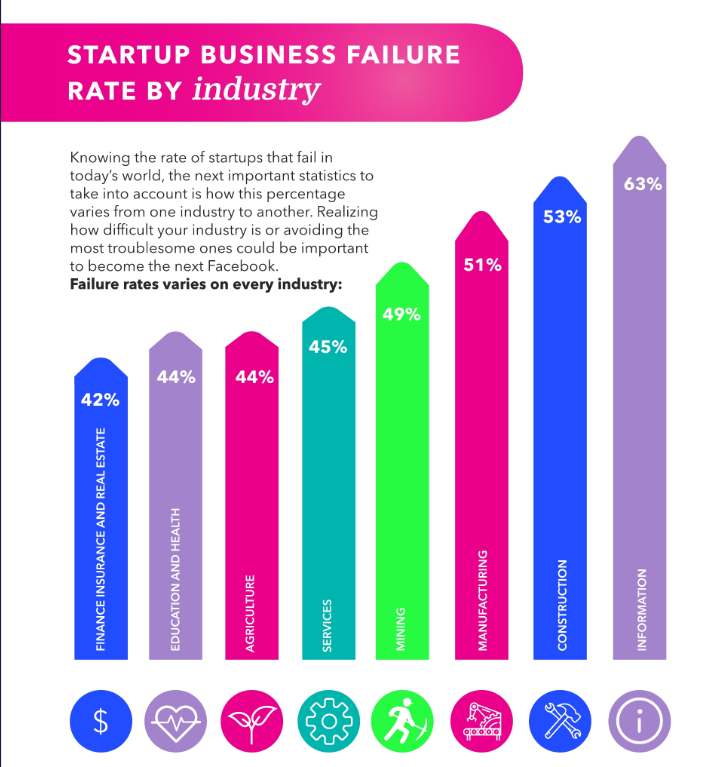Why do so many startups fail?

As Small Biz Trends research shows, 90% of startups fail at the very beginning – out of which, 60% belong in the IT industry. This is a really depressing number, considering the amount of new and aspiring startups popping out on the daily basis worldwide.

There is no success without failure – but real wisdom lies in learning from someone else’s mistakes. Below you will find examples of startups that failed and the reasoning behind it and also the features that help other startups succeed.
Common mistakes failed startups share

The above-mentioned study revealed that there are mistakes that unfortunate startups shared in common. Small Biz Trends used the data from CBI Insights to analyze and compile a list of top reasons for startup failure. We will take a closer look at each one from the study.
Lack of planning and strategy
When people are united by a cool idea, they tend to forget that there is a lot of groundwork to do before actually launching the startup. People somehow ignore marketing and promotion, do not have clear business goals and objectives and do not make any strategies at all.
For example, lack of marketing demand is one of the main reasons behind startup failures. If there is no research on product demand and competition, how can one be sure the users will buy the product?
The issue of financing is another “pain point”: lack of investment, underestimated risks, too much confidence, wrong goals – all that falls in the “planning” category and all that has to be calculated and analyzed before startup launch.
Lack of planning normally leads to total chaos when things start to get going: the founders get frustrated and don’t know what to do.
Lack of proper management
As well, if founders do not create a proper plan for managing their financing, they will end up losing money and failing their business. In addition, wrong pricing plays a big role too. There is a concept of emotional pricing when people set the price according to their own perception of “what sounds good”.
But it doesn’t work in business at all. Research market and competition, estimate your expenses and desired revenue and price your services based on that.
Business world has its own rules and if one does not know them, it’s better not to enter it. If the startup founder has little or no experience with management, teamwork, negotiation, establishment of working culture and so on, chances are high the startup will fail.
The competition is tough and there are very few really revolutionary ideas. So in order to stand out, the startup has to be managed flawlessly.
Problems within a team
Inner problems include lack of order or organization, overall lack of skill among team members, inability to communicate and negotiate.
In here also goes lack of focus, passion and motivation – all internal drivers of success that are underestimated at times but remain significant for overall success.
Perfectionism
Sounds strange but it’s true - too much perfectionism may actually hurt your business.
When a company strives to do everything perfectly, it dedicates too much time and effort on refining every process and detail.
Considering the ever-changing business environment, chances are high your competitors will be faster than you and will outperform your business before it is monetized.
Too late / too early monetization
Monetization is basically the way you will earn money with your business - but it has to be planned carefully. Otherwise, it will not only bring you zero profit but force to shut your startup down.
There are hundreds of products out there that might be similar or almost identical to yours. So why would the user choose to pay for your product? Therefore, one has to adopt a wise monetization strategy.
Sadly, many newborn startups either rush at monetization too early or remember about it too late, when they already fully run out of cash or investment.
Real-life cases of failure among startups

Below are some of the startups that were actually really good – but they lacked little something that prevented them from going big.
Frendster
If you did not know that, Frendster was the very first social network, somewhat similar to Facebook. Unfortunately, it lacked in features and that caused Frendster to close.
It was launched in 2002 and got $50 million in funding – an impressive amount of money. The company could have succeeded but due to limited functional had to go in decline.
It was profile-oriented: meaning, you could only create your own profile and view profiles of your friends, that’s it. No newsfeed, likes or sharing – but Frendster served as a knowledge base for Facebook.
Pets.com
This one is even older than Frendster: Pets.com was launched in 1998. The website offered online selling of pets products – a simple yet good idea. The company also received huge funding and was predicted success.
The reason behind its failure was not in the idea but in the market. At that time, there was no market suitable for such product and the company had to shut down.
Things to consider to avoid failing

We covered the most common mistakes that startups make – but what about best practices to keep in mind?
Here is what any startup at least must do in order to stay alive:
- Careful and thorough planning before launching the business: business goals, strategy, target audience, competition and market analysis – all that should be done in advance
- Differentiation: define your unique selling points and play your strengths
- Flexibility: adapt to changing customer behavior and requirements and always leave room for improvement
- Quality: always strive for the highest quality of your products and services because it will be the best indicator of your professional attitude.
- Balance: on your way to achieve the above-mentioned quality, do not go to the extremities in order to do everything perfectly. Think about your monetization, keep an eye on the competition and stick to the development pace that would be sufficient enough to stay among front-runners.
And remember: it’s OK to fail at times. Even the best of the best went through hard times. What matters is your willingness to get up and try harder. In the end - the most important reason to success - is to truly love what you do.